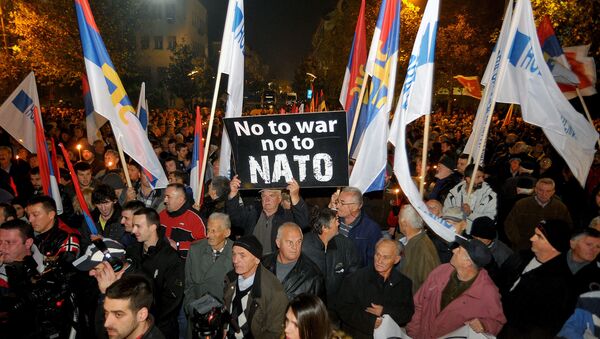Earlier Republika Srpska, one of the constituting parts of Bosnia and Herzegovina, announced its intent to hold a referendum on whether the country should join NATO. However, this decision to implement a purely democratic procedure was met with a barrage of criticism from Sarajevo
As Sputnik Srbija points out, the history of referendums held in the Balkans serves as an excellent example of the fact that the right to implement the tools of democracy is regulated by non-democratic principles.
For example, during a 1998 popular vote in Yugoslavia over 94 percent of the respondents voted against foreign representatives taking part in resolving the Kosovo issue. The referendum’s results however were promptly ignored by the international community.
Professor Kosta Cavoski of the University of Belgrade Law Faculty told Sputnik that there’s no universal approach towards referendums amongst the international community.
"Whether the results of a referendum would be accepted or not depends on realpolitik interests. When Slovenia and Croatia voted for independence, those referendums were treated as legitimate. But when Crimea, a region populated mostly by Russians, voted for seceding from Ukraine and returning to Russia — the country it was a part of for several centuries – this decision is still being disputed by the international community for some reason. So it all comes down to realpolitik and not to law principles which simply don’t exist in international relations," Cavoski explained.
Meanwhile, Professor Slobodan Orlovic of the University of Novi Sad Law Faculty pointed out that while Serbia can technically hold a referendum on whether to join NATO or not, for example, the country’s parliament cannot authorize popular votes on matters that are regulated by international agreements. Therefore, if the country’s prime minister or foreign minister signed an agreement to join NATO, the parliament would be unable to counteract this move by means of a popular vote.
Cavoski also added that the decision whether to hold such hypothetical referendum in Serbia would largely depend on how Western governments would evaluate its potential outcome.
According to Professor Cavoski, the Western powers had foreseen that a referendum on NATO membership in Montenegro would’ve rejected the idea, so that referendum simply didn’t happen. And even if such popular vote would be held in Serbia and the majority would vote against joining the alliance, the West would simply ignore their opinion.
Sarajevo and Brussels have been discussing Bosnia’s NATO membership since the mid-2000s, as Bosnia and Herzegovina joined NATO’s Partnership for Peace program in 2006. As part of the reforms stipulated in the program, Republika Srpska’s armed forces and defense ministry were abolished and control over the RS Army was transferred to a state-level ministry.



